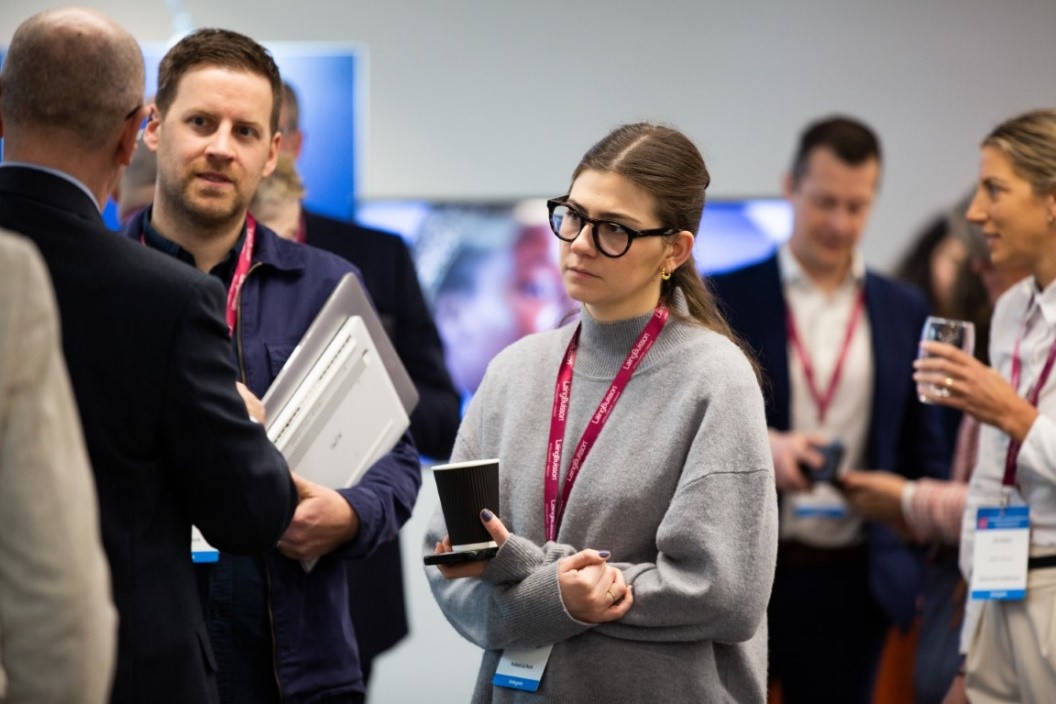Last week the Rabbit and Pork team had the pleasure of travelling to Birmingham for the Innovation in Care conference.
This one-day event, held at the Eastside Rooms in Birmingham, covered all aspects of innovation in the healthcare industry, with a specific focus on care homes and at-home care. It was fascinating to hear about all the different innovations that are helping various aspects of the care industry, including those designed to help residents and those to assist the greatly pressured workforce. Throughout the day, Alexa and conversational AI were continuously referenced as technology which can benefit the healthcare industry.
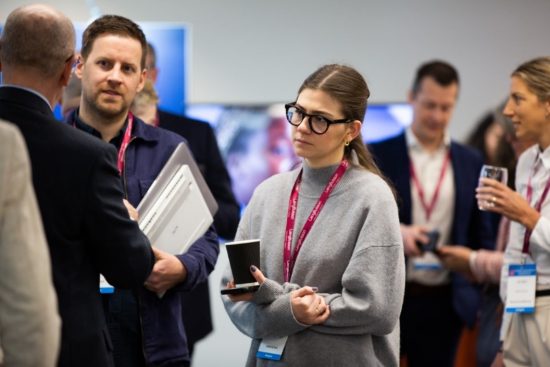
John and Christina from The Rabbit & Pork team
The Rabbit & Pork team have selected a few highlights from the day’s presentations and panel sessions. Read on to find out more.
‘Siri for care’
First delivering the keynote was Ben Maruthappu, CEO and co-founder of Cera Care. In a bid to reduce visits to A&E, Cera Care are trialling an AI voice assistant healthcare model. This service allows people to talk to their voice device and query their symptoms, answering a series of questions posed by AI technology, their answers are then analysed by the AI to monitor health conditions and identify any significant changes. As an automated phone call, this could save a call to emergency services. Conversational AI can remind people of medication information.
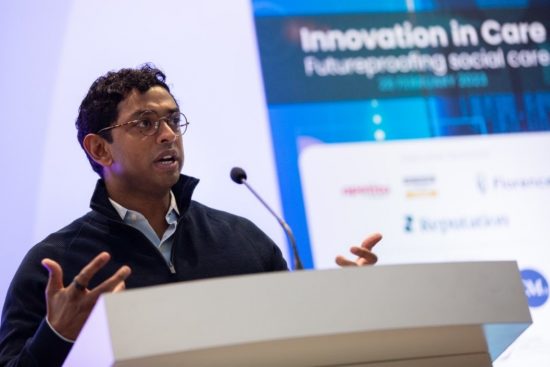
Ben Maruthappu, CEO and co-founder of Cera Care
This is an interesting merge of both traditional and new technology, namely, traditional landlines which many of the older generation are very accustomed to using, merged with conversational AI. Fundamental to this service, is that it is the technology that initiates the conversation by calling the person at home.
Then in a true innovation style Ben showed the power of ChatGPT using it to answer the question that all the attendees were looking to answer today. What does the future of care looks like? ChatGPT had a pretty good answer, however its the care homes, solution providers, commissioners and end users that will have the biggest say in what the future looks like in the care sector.
Stock levels
Next up, William Laing from LaingBuisson provided an overview of the state of care, looking specifically at property funding and staffing levels. The care sector currently has some difficulties surrounding stock (care home properties) levels, that is to say, the number of properties and beds, for example, in the care sector. Increased building costs make it hard to catch up with demand, despite there being sheets of recovery.
Autonomy
A panel discussed how conversational AI and innovation were helping the care workforce, covered in a few topics. Anne-Marie Perry from Care match and Trudie Fell from Bellevie highlighted the importance and the power of giving small teams autonomy and the freedom to make their own decisions.
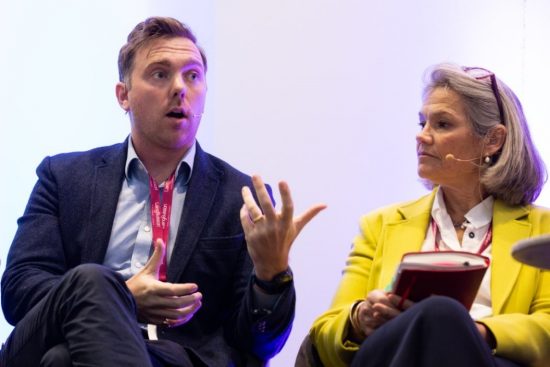
Charles Armitage from Florence with Anne-Marie Perry from Care
Commissioning for innovation
The most interesting session of the day was on Commissioning for innovation. Juliette Malley, an Assistant Professorial Research Fellow at the Personal Social Services Research Unit at London School of Economics, spoke about the work that the SASCIProject is undertaking. This five-year study is being carried out to build evidence on how to support the adult social care sector to implement and spread innovation.
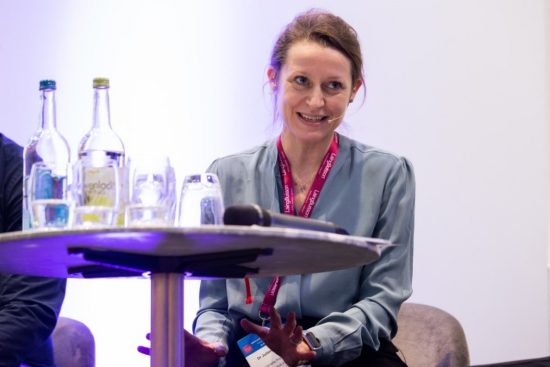
Juliette Malley, an Assistant Professorial Research Fellow at the Personal Social Services Research Unit at London School of Economics
Feedback into the innovation of technology
Nick Weston from Lilli gave an insight into how providers need to start producing data and insights on the ROI of their products. The most important insight came from Teresa Henderson, a care resident, who spoke on how often the end user, in this case being a care resident, is the last person to provide feedback on the innovation of the technology, therefore having no impact on the product development. This is an issue because as the end user, they are the ones that hold key insight into how a product will be beneficial, and how those products can be developed to better suit them. From a person-centric design perspective, engaging with your end user should be done throughout all stages of a project, not just at the end.
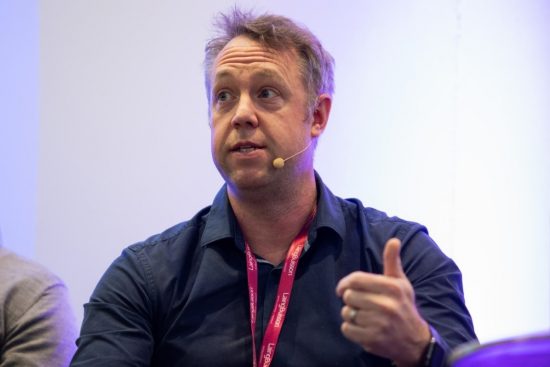
Nick Weston from Lilli
Robots vs. Humans
Rob Parks, Founder and CEO of Service Robotics Ltd, spoke about the positioning of automation, innovation, and technology which are often in the public seen as “robots replacing the jobs of humans”. Despite this illusion, it is that estimated 1.5 million elderly people are not receiving the support they need (Age UK) and in May 2022, ADASS estimated that over 500,000 people were waiting for assessments, reviews, or care to start.
Therefore, in reality, conversational AI is not, in fact, removing the need for humans, rather this technology will be used to make up that shortfall, completing tasks and jobs that are not being done, or making existing tasks quicker for humans.
Design for technology
The new build panel discussed innovation around the building of new properties and how sustainability concerns have only just started to impact the industry.
New-build properties provide an opportunity for technology to be designed into the properties, in comparison to simply retro-fitting old properties.
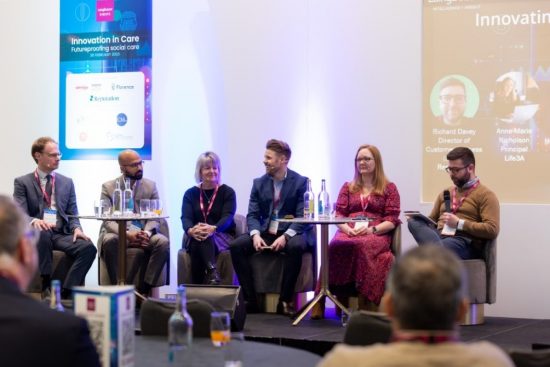
Panel on Design for technology
Ashish Goyal highlighted how the interior design and fitting considerations for new homes should extend to staff areas. As places to relax, these areas are important to staff wellbeing.
Shirley Hall, Head of Care and Wellbeing at Retirement Villages Group, spoke from first-hand experience that design for technology is now even more important, and how simple considerations around the placement of handles and shower taps, for example, need to be considered.
Aaron White, Head of Business Services at Oakland Care, addressed how Oakland Care Oakland Care became the first care home in the UK to be carbon-neutral, and it all started with a simple change. It all started with designating a recycling bucket in the office for batteries. However, in general, the care sector is behind other sectors in going carbon-neutral.
Final thoughts
Tobi Alli-Usman, Founder & Managing Director of Smooth Digital, rounded off the day with a summary of the event. Picking out the major points from the day and that how the care industry is embracing innovation already but there is still lots to be done.
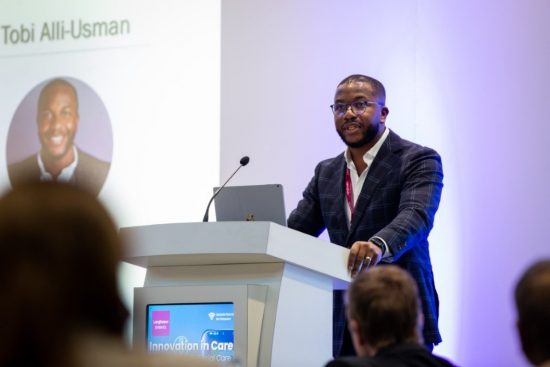
Tobi Alli-Usman, Founder & Managing Director of Smooth Digital,
Rabbit & Pork found that Innovation in Care 2023 provided plenty of food for thought.
If you are interested in discussing Alexa Smart Properties for Smart Living, please contact us here.
Photos sourced from https://laingbuissonloop.com/
